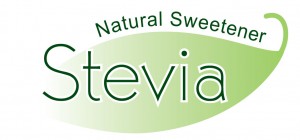What is Stevia?
Stevia is a natural, calorie-free sugar substitute that is derived from the South American stevia rebaudiana plant. The plant is dried and powdered to make this substance and is almost 300 times sweeter than sugar and can be used in a similar fashion in cooking and baking.
For centuries, stevia plant has been used as a sweet herb in many parts of the world. Traditionally, the leaves were dried and added to foods, beverages and medicines, or simply chewed like candies. Today, many consider stevia as a healthy alternative to regular table sugar because it of its reduced sugar and calorie content.For centuries, stevia plant has been used as a sweet herb in many parts of the world. Traditionally, the leaves were dried and added to foods, beverages and medicines, or simply chewed like candies. Today, many consider stevia as a healthy alternative to regular table sugar because it of its reduced sugar and calorie content.
The earliest scientific record of stevia plant dates back to 1899 when Moises Santiago de Bertoni first defined it as Eupatorium rebaudianum. In 1905, it was later classified as a member of the sunflower (Compositae) family and then renamed as Stevia Rebaudiana. Japan became the first country to commercially adopt stevia as a sugar substitute during the 1970s. And at present, the country continues to be the leading and most diverse user of stevia.
However, in the U.S., stevia is a relatively new addition in the growing list of sugar substitutes or artificial sweeteners which was granted the status “Generally Recognized as Safe” (GRAS) only in 2008. Until then, stevia was available only as a “dietary supplement” in the U.S. Currently, refined stevia preparations are widely used in the U.S. as a “food additive” and is marketed under different brand names such as Pure Via and Truvia. Stevia is also commercially available in many countries worldwide.
Stevia Extract

The sweet taste of stevia comes from a compound called steviol glycoside which is found in the plant leaves. These sweet compounds are harvested from the plant by soaking the leaves in water. The extract will then undergo filtration and purification process to remove unwanted plant matter. This yields a concentrated stevia extract which may contain one or more steviol glycoside. One popular steviol glycoside is Reb A or Rebaudioside A which is known for its great sweet taste and abundance in stevia leaves. Unlike other artificial sweeteners, stevia extract is said to be all-natural and does not undergo any chemical modification. Steviol glycosides found in commercially available products are the same and unmodified type of the compound naturally found in stevia leaves. Usually, stevia products sold in the market contain at least 95% steviol glycosides and are sweeter than crude stevia extracts.
Aside from tabletop sugar products, stevia can be found in various food and beverage products such as baked goods, cereals, confections, flavored milks, juices, salad dressings, sauces, and teas.
Stevia Uses
Stevia is primarily used as a natural sweetener. Diabetics can use stevia in place of sugar to help control their blood sugar without the need to give up their favorite sweet dishes. Stevia is also used as a weight loss tool, because it is calorie free, unlike sugar, and can help control cravings for rich, sweet dishes with a purportedly healthy substitute. Some studies have also indicated that certain side effects may be useful for treating high blood pressure, heartburn and inflammation. However, the evidence for these types of benefits is as yet insufficient.
Health Benefits
Stevia is said to be a healthy alternative to regular tabletop sugar. According to manufacturers, stevia can be used to partially or completely replace regular white sugar. It can help reduce carbohydrate and calorie intake of users which is beneficial for people who need to reduce or avoid sugar and calories, such as for those with diabetes, hypertension, and heartburn. It also supports healthful recommendations to reduce sugar and calorie advocated by many medical and public health experts. In addition, since stevia does not contain carbohydrate, it is thought to be tooth friendly which can help prevent dental problems.
Safety
Major governing bodies such as the U.S. FDA and the European Commission have approved stevia for use as a sweetening ingredient. It is generally accepted as a safe sugar substitute and is backed by rigorous researches and studies acknowledged by major health organizations worldwide.

